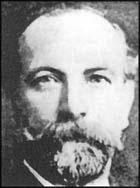 James
Allan was born in Scotland in around 1855. After studying at
Glasgow University he arrived in Sunderland to teach at Hendon
Board School in 1877. James
Allan was born in Scotland in around 1855. After studying at
Glasgow University he arrived in Sunderland to teach at Hendon
Board School in 1877.
Allan had developed an interest in football while at university
but discovered that rugby was the predominant winter team sport
in the North-East. As Roger Hutchinson points out in Into the
Light (1999) "Allan uncovered a group of other teachers in the
area who shared his interest in righting this wrong, and at a
meeting in Norfolk Street in the October of 1879 the Sunderland
and District Teachers' Association Football Club was formed."
The team originally played at Blue House Field that was close to
the Hendon Board School where James Allan was employed. The
captain was Robert Singleton, the headmaster of Gray School in
Sunderland. Other school teachers in the side included John
Graystone and Walter Chappell.
Allan and his friends rented the ground at Hendon for £10 a
year. They also had to pay the travelling cost of taking a team
to away games throughout the North-East. At a meeting in October
1880 they discussed the possibility of closing the club.
However, it was eventually decided to raise the money by opening
it up to non-teaching members. As a result the club changed its
name to Sunderland Association Football Club.
As the author of Sunderland: The Official History points out:
"The club was formed not by shipbuilders or miners, but by
school teachers, local school master James Allan having taken
the initiative in organizing such a venture. More surprisingly
still, the teachers not only formed the club, but made up the
entire team too, and the club's original name - Sunderland and
District Teachers' Association Football Club - reflected this."
James Allan was a talented centre-forward with a good goal
scoring record. In 1883 Allan's goals helped Sunderland reach
the final of the Northumberland & Durham Cup. The following year
the club played Darlington in the first final of the Durham Cup.
Sunderland won 4-0 but Darlington complained that the 2,000 fans
were guilty of intimidating their players. The Football
Association ordered the final to be replayed and sent Major
Francis Marindin to referee the game. This time Sunderland won
the game 2-0.
In 1884 Allan was one of the six Sunderland players selected for
the Durham County side which played Northumberland.
On 20th December, 1885, Sunderland beat Castletown 23-0 in the
first round of the Durham Association Challenge Cup. James
Allan, who played on the left-wing, scored 12 of the goals. This
remains a Sunderland club record.
In an attempt to improve the team Sunderland began recruiting
players from Scotland. The Football Association decided that
professionalism should be allowed, but with restrictions. Any
professionals had either to have been born in the town they
represented, or to have lived within six miles of their club's
headquarters for the previous two years.
In 1887 Sunderland beat Middlesbrough 4-2 in an early round of
the FA Cup. Middlesbrough protested that three of Sunderland's
players (Monaghan, Hastings and Richardson) were living in
Scotland and was lodged at the Royal Hotel at the club's
expense. In January 1888, the Football Association examined the
Sunderland books and discovered "a payment of thirty shillings
in the cash book to Hastings, Monaghan and Richardson for train
fares from Dumfries to Sunderland". Sunderland was kicked out of
the FA Cup and ordered to pay the expenses of the inquiry. The
three players concerned were each suspended from football in
England for three months.
Allan, who disliked the idea of recruiting professional players,
resigned from the club. On 13th March 1888 he organized a
meeting at the Empress Hotel. The meeting decided to create
Sunderland Albion. Allan managed to persuade six first-team
players from Sunderland to join him.
Sunderland and Sunderland Albion now became bitter rivals. The
two clubs were drawn together in the 1888-89 FA Cup. However,
Sunderland withdrew rather than allow Albion to benefit from the
increased gate receipts.
Allan ensured that Sunderland Albion were founder members of the
Football Alliance in 1889. Sunderland joined the Football League
in 1890. Albion responded by joining the Northern League but the
success of the Football League meant that they had difficulty
keeping the loyalty of their supporters. When Sunderland won the
Football League title in 1892 Albion accepted defeat and closed
down. |
|
|


